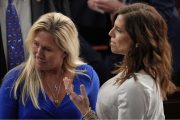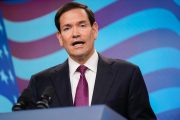Donald Trump would be “dangerous” were he to be elected president, declared UN High Commissioner on Human Rights Zeid Ra’ad al-Hussein, in a condemnation this week of the Republican candidate for president.
Zeid said that Trump’s remarks on torture and “vulnerable communities” are “deeply unsettling and disturbing to me.” This is not Zeid’s first verbal attack upon Trump. His latest criticism centered on Trump’s remarks that he favored the use of “waterboarding” to extract information from captured terrorists. Zeid said that the use of waterboarding — an interrogation method used while George Bush was president, but banned by an Obama executive order, in which the person being interrogated has the sensation of drowning — is prohibited under the Convention against Torture, a treaty agreed to by the United States.
Trump has insisted that he would overturn Obama’s executive order and reauthorize the waterboarding of captured terrorists, arguing that “torture works.”
Previously, Zeid had called Trump a bigot, taking issue with his policy against unrestricted immigration. Vitaly Churkin, the Russian ambassador to the UN, headquartered in New York City, took Zeid to task for criticizing foreign heads of state and government “for their policies. This is not his business. He should be more focused on his specific responsibilities.” Zurkin filed a formal complaint with the UN’s secretary-general about Zeid.
Zeid has said that he understands the UN charter’s restrictions that require the international body from interfering in the internal affairs of its members, but justified his comments by saying that South Africa had used such arguments to defend its policy of apartheid. He noted that the general assembly had rejected South Africa’s complaints “time and again.”
In other words, to Zeid, the provision of the UN charter that prohibits the organization from intervening in domestic matters is meaningless and can be ignored, depending on the situation. “Clearly I am not keen or intent on interfering in any political campaign within any particular country,” Zeid said. But in Trump’s case, he believed he should speak out. Zeid has also castigated what he calls nationalistic and xenophobic leaders in Europe.
When asked specifically about Trump, Zeid was blunt, “I always believe that it’s incumbent on leaders to lead and to lead in a way that is ethical and moral. The use of half-truths is a very clever political advice. Because as every propagandist knows, you allow the listener to fill in the rest.”
In addition to his challenge of Trump’s position on waterboarding, Zeid also took issue with Trump’s positions against illegal immigration, accusing Trump of pushing “humiliating racial and religious prejudice.” Zeid argued, “We have to be on guard to see that in the end vulnerable populations, populations at risk do not again see their rights deprived because of a view that is in the ascendancy based on false premises.”
Just who is Zeid?
His great-grandfather, Hussein bin Ali, was the Emir of Mecca, in the days of the Ottoman Empire, until the First World War. During the Great War, it was British policy to turn the Arabs against the Ottoman Turks (who were allied with the Germans and the Austrians against Britain). Zeid’s grandfather was the Commander of the Arab Northern Army, from 1916-1919. In 1918, T.E. Lawrence (who organized the Arab rebellion against the Turks, made famous in the movie Lawrence of Arabia) suggested he be made king of a truncated north-western Syria.
Zeid was born in Jordan, and educated at Johns Hopkins in the United States, where he was a star player for the school’s rugby club. He spent two years as part of the UN force in the former Yugoslavia, and was Jordan’s ambassador to the United States from 2007-2010. Moving up the ladder of UN positions, including serving as Jordan’s ambassador to the UN, Zeid ascended to president of UN Security Council in January 2014.
He was an important leader in the creation of the International Criminal Court, and is a strong advocate of international prosecution of those whom he considers guilty of human rights abuses, specifically lecturing the United States that it has an obligation under international law to prosecute all of those responsible for torture by the Central Intelligence Agency (CIA). His targets would include not only those who carried out the interrogations policy, but also the superiors who issued the orders.
Finally, in June of 2014, Zeid took over the position of human rights commissioner at the UN upon the recommendation of UN Secretary-General Ban Ki-moon. He was the first Muslim to head the Geneva-based agency of the UN. He has said, “There is no justification ever, for the degrading, the debasing or the exploitation of other human beings — on whatever basis: nationality, race, ethnicity, religion, gender, sexual orientation, disability, age or caste.”
Zeid has leveled strong condemnation of ISIS, asking if they “believe they are acting courageously, barbarically slaughtering captives?” He points to the massacres, beheadings, rape, and torture as examples of what an ISIS state would look like. “It would be a harsh, mean-spirited house of blood.”
While one can share sympathy with his condemnation of ISIS, Zeid’s solution for avoiding atrocities such as the Holocaust should also be noted: He proposed “human rights education” for every child on the planet, beginning before the age of nine. “In this way, from Catholic parochial schools to the most secular public institutions, and indeed Islamic madrassahs, children could learn — even in kindergarten — and experience the fundamental human rights values of equality, justice and respect.”
Of course, such a policy would require an intervention into the internal affairs of the UN’s member nations far beyond anything that has been seriously proposed in the past. It is clear from Zeid’s comments, though, that he is a strong advocate of a world government powerful enough to impose its will upon the various nations of the world — whether their governments be led by Hillary Clinton or Donald Trump.
The Syrian government certainly has little respect for the neutrality of the UN, recently charging that the secretary general “has repeatedly harmed the credibility and objectivity of the UN, having made it subject to the will of some sides and made himself a party in the problems sweeping our world today without showing the least commitment to the ethics and requirements of his mission as per the principles and goals of the UN Charter.” The official claimed that Ban ki-Moon is among those “legally and morally” responsible for the current situation in Syria, as he opted to act in line with the policies of “some countries” toward Damascus.
While some may agree (or disagree) with a policy that would lead to the overthrow of Syrian President Bashar Assad, this is the sort of precedent that UN officials such as Zeid use to justify interfering in the presidential election of the United States — in this case, in effect, taking the side of Democratic candidate Hillary Clinton over Republican candidate Donald Trump.
When Zeid charges that Donald Trump is “dangerous,” one must ask an obvious question: Dangerous to whom?




